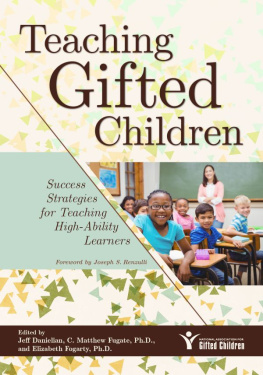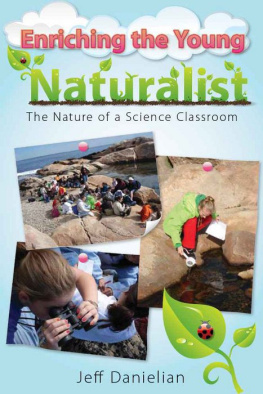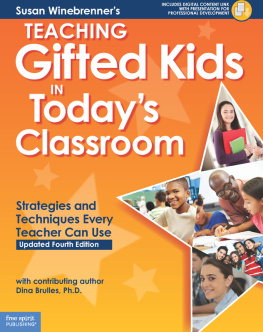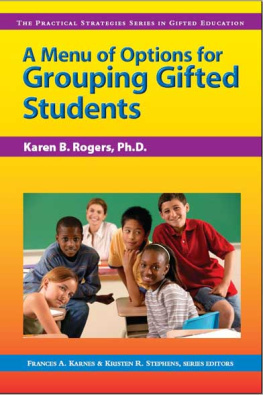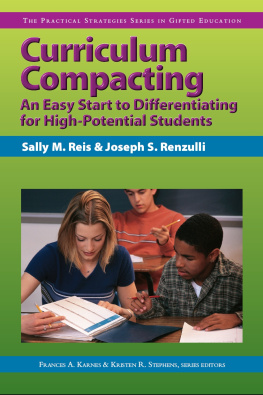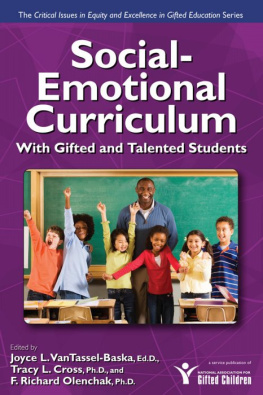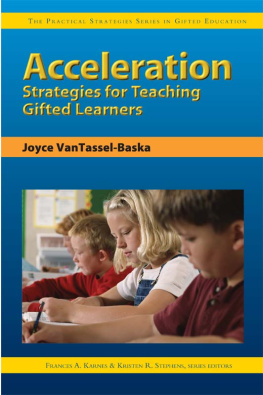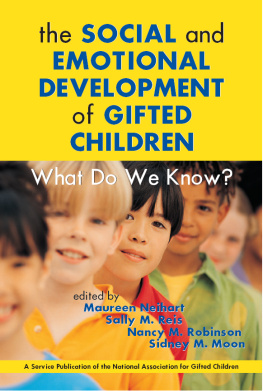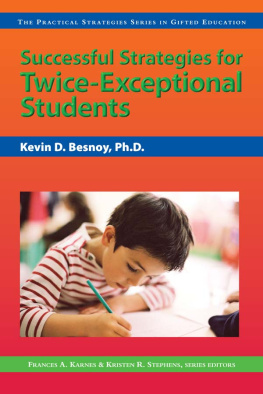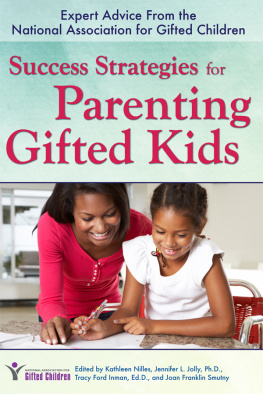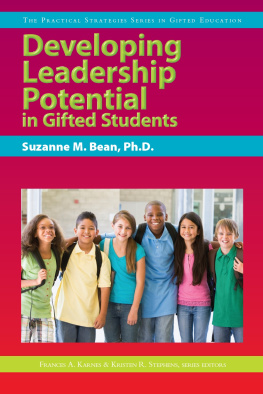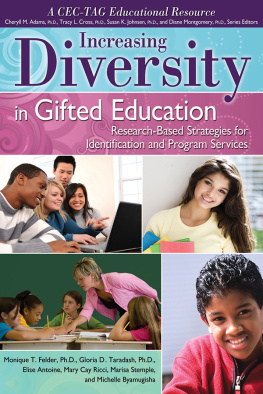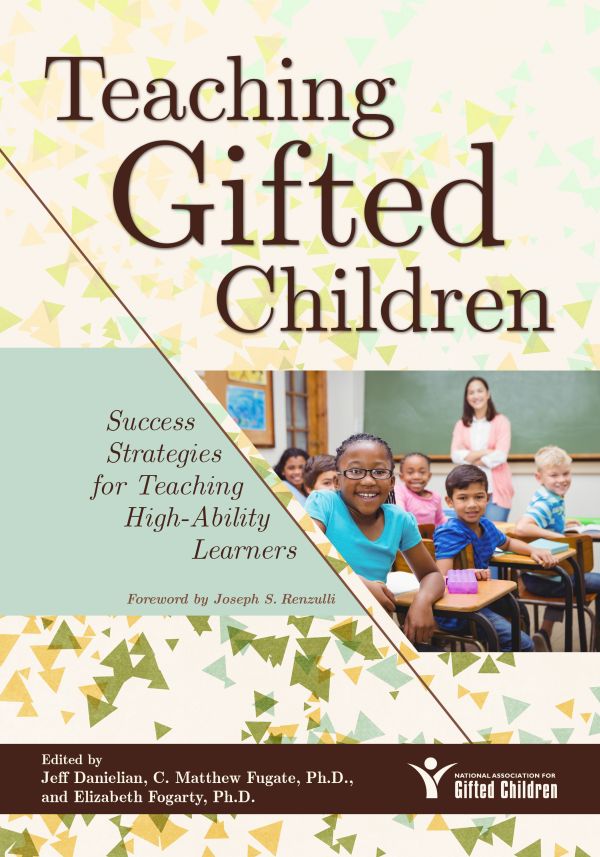


Library of Congress Cataloging-in-Publication Data
Names: Danielian, Jeff, editor.
Title: Teaching gifted children : success strategies for teaching high-ability learners / edited by Jeff Danielian, C. Matthew Fugate, Ph.D., and Elizabeth Fogarty, Ph.D.
Description: Waco, Texas : Prufrock Press : National Association For Gifted Children, [2018] | "Copublished With the National Association for Gifted Children."
Identifiers: LCCN 2017032969 (print) | LCCN 2017034329 (ebook) | ISBN 9781618216731 (pdf) | ISBN 9781618216748 (epub) | ISBN 9781618216724 (pbk.)
Subjects: LCSH: Gifted children--Education--United States.
Classification: LCC LC3993.9 (ebook) | LCC LC3993.9 .T438 2018 (print) | DDC 371.95--dc23
LC record available at https://lccn.loc.gov/2017032969
Copyright 2018, National Association for Gifted Children
Edited by Katy McDowall
Cover and layout design by Allegra Denbo
ISBN-13: 978-1-61821-674-8
No part of this book may be reproduced, translated, stored in a retrieval system, or transmitted, in any form or by any means, electronic, mechanical, photocopying, microfilming, recording, or otherwise, without written permission from the publisher.
For more information about our copyright policy or to request reprint permissions, visit http://www.prufrock.com/permissions.
At the time of this books publication, all facts and figures cited are the most current available. All telephone numbers, addresses, and websites URLs are accurate and active. All publications, organizations, websites, and other resources exist as described in the book, and all have been verified. The authors and Prufrock Press Inc. make no warranty or guarantee concerning the information and materials given out by organizations or content found at websites, and we are not responsible for any changes that occur after this books publication. If you find an error, please contact Prufrock Press Inc.

| Prufrock Press Inc.
P.O. Box 8813
Waco, TX 76714-8813
Phone: (800) 998-2208
Fax: (800) 240-0333
http://www.prufrock.com |
Table of Contents
by Rachel Levinson
by Paula Olszewski-Kubilius, Rena F. Subotnik, and Frank C. Worrell
by Kathryn Fishman-Weaver
by Steve V. Coxon
by Joanna Simpson
by Jennifer Hoffman
by Scott L. Hunsaker, Christen C. Rose, and Elinda R. Nedreberg
by LaVonda Senn
by Elizabeth C. Fairweather
by James Fetterly and Betty Wood
by Anna Cassalia
by Brian C. Housand
by Chea Parton
by Michael H. Miller
by Felicia A. Dixon
by Jason S. McIntosh
by Bronwyn MacFarlane
by Todd Jeffrey
by Sandra N. Kaplan
by Jennifer Beasley
by Chris A. Caram and Patsy B. Davis
by Willard L. White
by Susannah Richards
by Mary E. Haas
by Kimberley L. Chandler and Barbara Dullaghan
by Susannah Richards
by Scott J. Peters
by Bob Seney
by Eric L. Mann
by Michelle Sands
by Eric L. Mann
by Keri M. Guilbault
by Gail N. Herman
by Juliana Tay
by Kevin D. Besnoy
by Gail N. Herman
by Sara Newell
by Kenneth J. Smith
by Suzanna E. Henshon
by Timothy Lintner and Arlene Puryear
by Ed Robson
by Thomas N. Turner
by Rebecca N. Landis
by Alicia Cotabish, Debbie Dailey, Rachelle Miller, Steve V. Coxon, and Cheryll M. Adams
by Steve V. Coxon
by Kevin D. Besnoy
by Suzanna E. Henshon and Alyssa Del Campo
by Paul Bierman, Peter Gould, Jasmine Lamb, Christine Massey, Simon Norton, Jean Olson, Luke Reusser, and John Ungerleider
by Brian C. Housand
by James T. Webb
by Barbara A. Kerr
by Thomas S. Greenspon
by Thomas P. Hbert
by Thomas P. Hbert
by Richard M. Cash
by Bronwyn MacFarlane
by Jennifer Ritchotte
by Felicia A. Dixon
by Lori Andersen
by Steve V. Coxon
by Scott A. Chamberlin
by Susannah M. Wood
by Jennifer Beasley
by Jean S. Peterson
by Meg Strnat and Robin Young
by Meg Strnat
by Jennifer A. Fredricks, Kate E. Flanagan, and Corinne J. Alfeld
by Bob Schultz
by Katherine B. Brown and Diane J. Bresson
by Chin-Wen Lee
by Stacie L. Walker
by Donna Y. Ford and Robert A. King, Jr.
by Jaime A. Castellano
by Jerry Lassos
by Kimberley L. Chandler and Barbara Dullaghan
by Joy Lawson Davis
by Joy Lawson Davis
by Jennifer Beasley
by Rachelle Miller and Marcia Gentry
by Steve McCallum and Sherry Mee Bell
by Colleen Willard-Holt and Kristen Morrison
by Amos Gewirtz
by Traci McBride
by Bob Schultz
by Derek Davis
by Terence P. Friedrichs
by Alena R. Treat
Acknowledgements
Ariel Baska, Jaime A. Castellano, Steve V. Coxon, Ruth Lyons, Connie Phelps, Jennifer Ritchotte, and Sarah Sumners, for their careful review of the entire catalog of Teaching for High Potential (THP) issues. Without them, the process would not have been able to move forward.
Jane Clarenbach, for her keen eye and everlasting involvement with the publication of each and every issue of THP. Her work has been invaluable.
Richard M. Cash, Joy Lawson Davis, Rebecca D. Eckert, and Thomas P. Hbert, for their willingness to read through sections of the book and write a thoughtful introduction to an assigned section. In addition, we thank Rebecca for her work as the first editor of THP for the inaugural issue in 2006. She opened the door for what was to come.
Joseph S. Renzulli, for his initial inspiration, which led to the creation of THP. His continued support and encouragement moves the field and our individual ideas forward.
Stacy Frankel, THPs designer, whose expert layout and attention to detail is noticed in each and every issue.
Katy McDowall, our editor, who has made the process as smooth and enjoyable as possible. It has been an honor to work with her.
Foreword: Where the Rubber Meets the Road
A How-to Guide For Promoting the Goals of Gifted Education
by Joseph S. Renzulli
The test of all beliefs is their practical effect in life.
Helen Keller

The field of gifted education has benefitted from many years of high-quality research, theory development, and commentary about issues related to our field. This material has served as a solid foundation that gives any and all fields of study their unique identity. The real payoff of all this research and development, however, has no value until it can be translated into effective classroom practices. In order to make changes in the lives of the young people we serve, these practices must be easy for teachers to learn and to use and reasonable to integrate within the complexities of the industrial education establishment. Variations in financial support, local and state regulations, and administrative and parental expectations must be addressed by people who have been there and understand teachers ways of knowing and doing. The editors of
Next page
